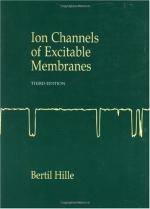|
This section contains 445 words (approx. 2 pages at 300 words per page) |

|
Cell membranes or plasma membranes surround cells, separating the cytoplasm and organelles on the inside from the extracellular fluid on the outside. Several cell organelles (mitochondria, endoplasmic reticulum, and Golgi bodies) are also bounded by membranes. The membrane allows a cell or organelle to maintain a constant internal environment, usually one that is quite different from the medium surrounding it. This is accomplished by the semipermeable nature of the membrane that regulates the passage of all substances going through it.
The detailed chemical composition of a membrane varies, depending on its location and the functions it performs. However, all membranes do have the same basic structure. The majority of the membrane is composed of two layers of phospholipid molecules lined up side by side with their fatty acid "tails" facing inward. The outer edges of the membrane are hydrophilic (soluble in water), while the interior area is hydrophobic...
|
This section contains 445 words (approx. 2 pages at 300 words per page) |

|


